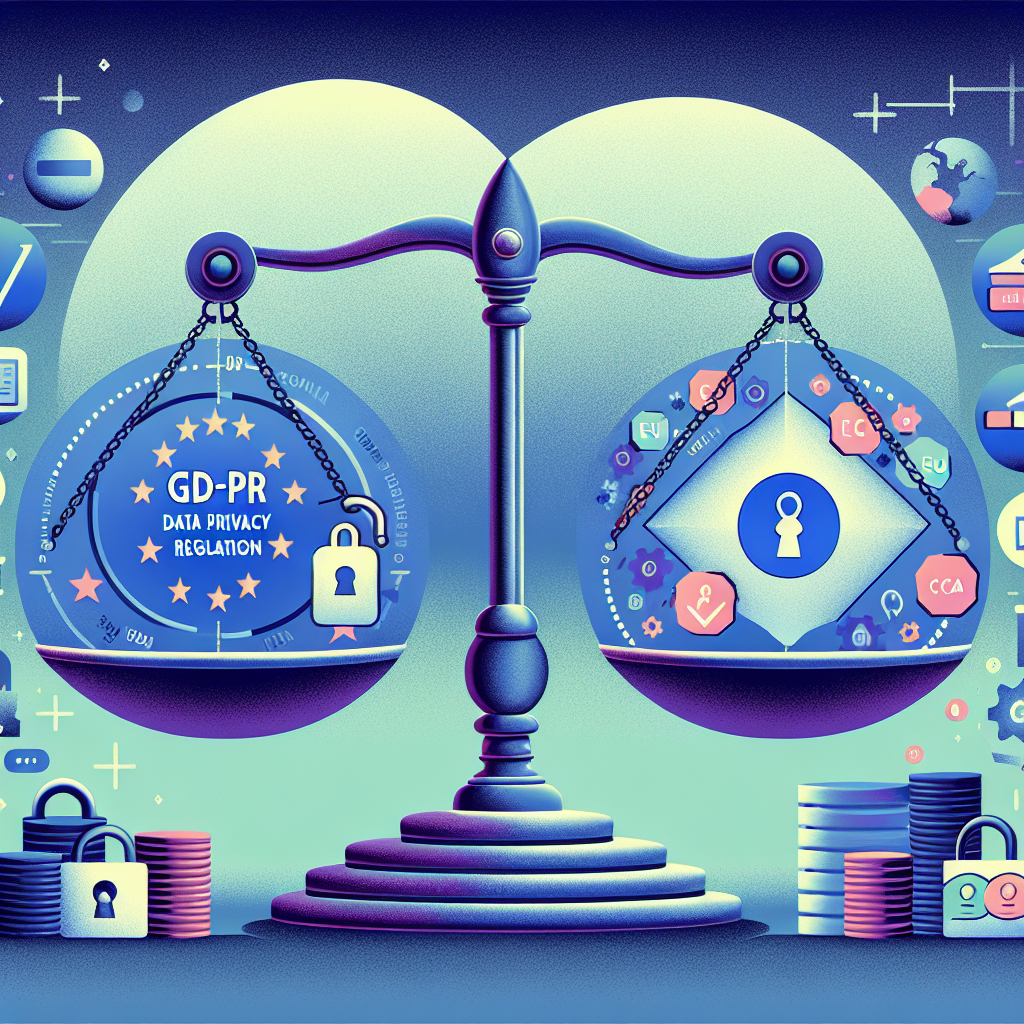[ad_1]
The landscape of data privacy has evolved dramatically in recent years. This article aims to explore and compare two of the most significant data privacy regulations: the General Data Protection Regulation (GDPR) and the California Consumer Privacy Act (CCPA). Both laws mark vital shifts in how personal data is handled, offering consumers greater control while placing noteworthy obligations on organizations. Through this analysis, we will delineate key differences and similarities, along with insights into their implications.
Background of Data Privacy Regulations
Data privacy regulations have emerged as essential frameworks to protect consumers in an increasingly digital world. The GDPR and CCPA represent progressive steps in defining users’ rights and businesses’ responsibilities in terms of data handling.
General Data Protection Regulation (GDPR)
Enacted in May 2018, the GDPR originated from the European Union (EU) to unify and strengthen data protection across member states. It aims to empower citizens regarding their personal data and reshape how organizations across the region approach data privacy.
California Consumer Privacy Act (CCPA)
Introduced in 2018 and effective from January 2020, the CCPA is the first comprehensive privacy legislation in the U.S. It mirrors some principles of the GDPR while addressing specific Californian consumer needs.
Key Principles of GDPR and CCPA
GDPR Principles
- Data Minimization: Only necessary data should be processed.
- Purpose Limitation: Data should only be collected for specified, legitimate purposes.
- Accountability: Organizations must demonstrate compliance.
- Right to Access: Consumers can request and receive their data.
- Right to Erasure: Consumers can request deletion of their data (the ‘right to be forgotten’).
CCPA Principles
- Consumer Rights: Consumers can know what data is being collected about them.
- Right to Deletion: Consumers have the right to request deletion of their data.
- Opt-out Rights: Consumers can opt-out of the sale of their personal data.
- Non-discrimination: Consumers should not face discrimination for exercising their rights.
A Comparative Analysis
Scope and Applicability
| Aspect | GDPR | CCPA |
|---|---|---|
| Geographical Scope | Applies to all EU citizens, regardless of where the data controller is located. | Applies to businesses within California or those serving CA residents. |
| Business Size | No revenue thresholds for applicability. | Minimum revenue of $25 million, or handling data of 50,000+ consumers/devices. |
| Data Types | Protects personal data broadly, including offline and online data. | Focuses on personal information connected to consumers (e.g., name, address, email). |
Consumer Rights
| Consumer Rights | GDPR | CCPA |
|---|---|---|
| Right to Access | Consumers can request information about their data. | Consumers can request disclosure of data collection practices. |
| Right to Rectification | Consumers can request corrections of inaccurate data. | No specific provision for rectification. |
| Right to Erasure | Consumers can request complete deletion of their data. | Consumers can request deletion of personal information. |
| Right to Data Portability | Consumers can obtain and reuse their data across services. | No equivalent provision. |
Data Insights
Both GDPR and CCPA have profound implications for businesses and consumers. Here are some noteworthy insights:
- Compliance Costs: Companies may incur significant expenses in adapting to these regulations. For instance, GDPR compliance can range from €1 million to €5 million depending on the size and complexity of data operations.
- Consumer Awareness: Data privacy has become a focal point for consumers, with up to 79% of consumers expressing concerns about their online privacy.
- Enforcement: The potential fines under GDPR can reach up to €20 million or 4% of a company’s global revenue, while CCPA enforcements can result in fines of up to $7,500 per violation.
Conclusion
As global data privacy regulations continue to evolve, understanding the intricacies of frameworks like GDPR and CCPA is paramount. Both regulations set important precedents for consumer rights, although they address privacy from different angles. GDPR emphasizes comprehensive protection for all EU citizens, while CCPA specifically targets the rights of California consumers.
Ultimately, as organizations strive to comply with these laws, the challenge will be to balance legal obligations with operational feasibility and consumer trust. The future of data privacy lies in transparency, integrated compliance frameworks, and fostering a deeper relationship between businesses and consumers.
FAQs
1. What is the main purpose of GDPR?
The main purpose of GDPR is to enhance data protection for individuals within the EU and address the export of personal data outside the EU.
2. How does CCPA differ from GDPR?
While both regulations focus on consumer rights, CCPA applies primarily to California residents and has business size thresholds, while GDPR applies broadly across the EU regardless of the organization’s size.
3. Are there penalties for non-compliance?
Yes, both regulations impose significant fines for non-compliance—GDPR can be up to €20 million or 4% of global revenue, while CCPA can incur fines up to $7,500 per violation.
[ad_2]
